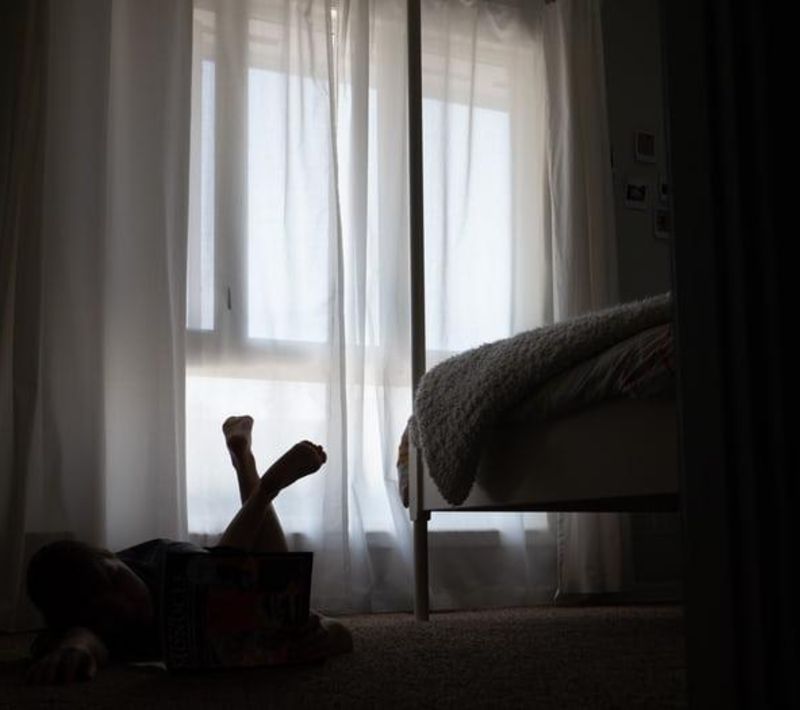Face Mask

Mommy says,
“When I was a girl. People didn’t say bad things about the dead. They’d go like, ‘No oh! That person don die. Abeg, make we no talk about am.’ So it’s very strange now when I hear people say reckless things about dead people.”
***
The first time I met Anama was one September evening. I remember because it was resumption and I had only just gained admission into the university. I arrived at the room before her and had already begun getting along with the other girls. She came when it was almost dusk. Her things were not much, so she did not need assistance as such. Even if she did, I doubt I would have helped. She had such an intimidating mien, I was almost sure that we were not going to get along.
After she greeted everyone in the room, her next statement was directed at me. I almost melted. I heard her voice but I could not comprehend a word of it. She had an almost foreign accent that made her even more unreachable than she already seemed. “Of all the people in the room, why was it me she chose to speak with first?” I wondered. But she had said something and instead of sitting on my bunk, endlessly staring at her like an absolute dunce, I had to reply.
“Sorry?”
She smiled, but she was no longer looking at me. She was already putting her things away.
She lifted up from her doubled over position and reiterated. “I asked what the title of the song is, and who is the artist?”
“Oh! Fifth Harmony… Don’t Say You Love Me,” I replied.
“Ah! Nice. Is it a band?” she continued.
“I don’t even know.” I chuckled nervously.
“Could you share it with me please?”
“Sure!” I replied. She flashed another disarming smile and said, “Thank you,” then continued unpacking her things.
Don’t be fooled by the mien. The intimidation was an inadvertent disguise. Anama was one of the most beautiful persons I ever saw. Physically that is. She was almost perfect. Think of beauty and she’d rhyme with it. She was spot-on spotless. It also turned out she had a very beautiful disposition contrary to my initial assumption.
All of us in the room were students from different departments and we got along fine. We had deep conversations and the room was always filled with laughter. Everybody’s friend automatically turned into a room friend. We were generally very accommodating even of one another’s excesses. It seemed we were deliberately selected. There were times when we cooked and ate together and we did not need to draw up duty rosters. If there was a job to be done, anybody could take it upon herself and get it done without complaining.
My first year was a really memorable one. I think of it with an intense sense of gratification. Having been a boarder throughout the duration of my secondary school education and being akin to bullying and other acts of sheer wickedness from senior students, I didn’t quite know what to expect from senior colleagues in the university. Even though I had earlier on been told that the university was an adult school, a true representation of the “age is but a number” notion, it still did very little to ease my fears. But I’m grateful for the roommates I had. I would choose them all over again if the chance ever came my way.
For Anama though, she had very few friends. That’s if she had any at all. Usually, it was her coursemates who came around seeking her notes, materials, textbooks, or explanations to topics they did not understand. That’s right! She was what one would call a scholar. She was also a triangular student: hostel, class, fellowship. A few of her fellowship members visited her too. Once in a blue moon though. In the middle of the first semester of that year, we heard she turned down a position assigned to her at the fellowship. I doubt if anyone ever found out her reasons for doing so.
 Image Source: Unsplash.com
Image Source: Unsplash.com
There wasn’t much she said but she was a terrific listener. She also had a wonderful sense of humor. I remember once in the room, one of the other final year roommates had teased her about seeing her with a guy and had assumed he was her boyfriend.
The conversation actually went like this, “Oh baby! I saw you with your hot boyfriend yesterday.”
“Me? Hot boyfriend? Hahaha,” she laughed. “I don’t like hot food in my mouth sef. How am I nau supposed to handle the heat all over my body?”
I found myself leaning towards her even harder than I ordinarily would. She was so charming, so sweet that I often wondered why she did not have a swarm of people around her. It did not take too long for me to get the gist though.
As sweet as Anama was, she seemed to deliberately make herself into that spice that a recipe can do without. You enjoy it while it is there, there is a possibility of noticing when it isn’t, but it’s not an essential per se. You hardly even know its name let alone its nutritional value. She was like that. She let you approach till you were close enough to see her arm held out implying, “That’s enough now. This is how far you can come.” No! In fact, that description does not quite cut it. She was a wall on her own. The more I related with her, the more curious I got. But I was very good with formulas and she was a riddle.
Once during the first semester, I got to meet her father. The moment I set eyes on him, her beauty made perfect sense. He was so handsome and almost feminine even though he had a very masculine build. Their resemblance was so uncanny except of course the fact that his complexion was a little darker than hers.
The reason the meeting happened was that Anama had suffered a terrible menstrual ache that led us to rush her to the health center. She had suffered all through the night and could not sleep. First thing in the morning, we located her medical registration card, boarded a cab, and took her to get treated.
Painkillers were administered and we took turns staying with her since we needed to attend our own classes. Her father arrived a little into the morning after we informed him. He thanked us and took her home the next day. I noticed that her mother did not come. But there was no room for a surprise as she never really mentioned anything about her personal life.
She returned a week later and everything was back to normal. After that incident, we all developed a very nice rapport with her father. When she would call him, she would have the phone on speaker and we would all say hello. Even during his birthday, we sang to him and wished him well. The next weekend, she took us all out for a swim and take-out to mark the celebration. It was that day I learned to swim.
In all, the first semester was practically perfect. By the second semester, our bond grew stronger and we were sad in advance at the prospect of parting at the session’s end. We had grown that addicted to one another. The semester rolled by and before we could glance back to take a quick look at the prints our feet had made on the sand, we had arrived at the door of the examinations. Our schedules were all different, but Anama was billed to start and finish first. Before everybody’s first paper, we all said a word of prayer together and set out to conquer what we had come all the way preparing for.
 Image Source: Unsplash.com
Image Source: Unsplash.com
Then came the Thursday Anama finished her papers. She was officially a graduate. We were all excited. There was a culture of giving the newest graduates proper baths in their clothes and everything. The figurative meaning was to wash off the stress and strain of the just concluded university program. Beyond that though, it was simply for the fun. Anama told us from the outset that she was not sure she was cut out for all that. And though we still threatened that we were going to exert the same celebratory methods on her, we all still seemed prepared to cut her some slack.
She had gathered her things in advance prepared to leave. She seemed very excited and we were all caught up in her euphoria. It was the exam period and everyone was supposed to be extremely serious, but we still caught the time to laugh and crack jokes. We had planned that after the exams, we would all gather and go for a swim and our final take-out together. At least for the time being.
Since Anama returned very late Thursday night after she had finished her last paper, there was not much we could do. We just hailed her as she entered the room by shouting, “Graduate! The newest graduate in town,” and all that. Her smile was wide. She was visibly happy. Or so it seemed. She made dinner for all of us and got us all drinks. Then she retired to bed.
The next morning, she woke up first and did all the dishes before any of us were up. She cleaned the whole room, put all our misplaced items right, took her bath, got dressed, and put on her traditional light makeup. When I woke up, she was sitting on the edge of her bed pressing her phone. We greeted each other and I went to take my bath. On returning to the room, everybody was up and bubbling already. Then, she called our attention and began.
“I just want to let you girls know that in my four years, you are the best I have had. I’m so grateful to you all and I will carry you in my heart forever. No one will ever compare to you.”
Her little speech was followed by endless streams of, “awwwwwwwww…, I feel like crying right now. You are the best too,” and a multitude of other exclamations to affirm what she had said. It was a touching moment, but we managed to make it fun and laughable.
Then, her bunkmate asked her when she would be going home and she said, “Today.” That was followed by, “Oh! We are going to miss you.” Then another one of us asked, “But you are coming back sha?” To this, she smiled widely and said, “Well, hopefully.”
“What do you mean hopefully?” I reacted. “You have to come oh! We still have not gone for our takeout.” Everybody laughed and she just retained her smile.
By the time we all returned to the room, Anama’s mosquito net was neatly fallen and tucked underneath her mattress to form a sort of makeshift tent and her corner was cleared. So, we all reckoned she had gone home. We called her cellphone later in the evening to ensure she had safely made it home but it was switched off. We tried a number of times and when we could not get through, we carried about our various activities and prepared to complete our pending exams. We could not call her father because we did not have his contact information.
On Sunday, some of us went to our various fellowships while some remained in the room to read and prepare for subsequent papers. Although I was in my first year, I was already a leader in my fellowship, so I could not skip service.
When we all returned in the evening, Sophia complained that something was smelling in the room like a dead rat and a number of the other roommates concurred. They had each thought they were the only ones who noticed the smell. Then the hunt for the source of the smell began. Everybody walked around the room sniffing and Sophia noticed that it was coming from Anama’s corner.
While her net was down, it wasn’t see through because there was a dark purple curtain that draped around her bunk. So unsuspiciously, Sophia lifted Anama’s net. What she saw made her scream and run out and a series of other screams followed. I caught my breath and stood there transfixed. I was the closest to Anama in the room and I could not believe what had greeted my eyes. Sophia ran into the room again and forcibly dragged me out. Someone else had run to get the hostel porters.
Apparently, Anama had swallowed a month’s worth of sleeping pills and had lain in her bed that Friday morning when she had told us she was going home. Beside her pillow was a white envelope with a letter written in her exceptionally beautiful penmanship which read, “You girls are home. It’s where I want to be until the end.”
 Image Source: Unsplash.com
Image Source: Unsplash.com
The police were invited and her father came in too. He said he had assumed that she was still writing exams and that he had a culture of not communicating with her during her exam period as he would rather not distract her. I did not see him shed a single tear and I could not read his mind through his eyes.
Mommy says, “When I was a girl. People didn’t say bad things about the dead. They’d go like, ‘No oh! That person don die. Abeg, make we no talk about am.’ So it’s very strange now when I hear people say reckless things about dead people.”
It was very easy for people around to tongue-lash her and I wondered how they could do that without even a bit of restraint. Even my roommates were not exempt. It was in the face of Anama’s death that the import of Mommy’s statement hit me. When my mommy was a girl, people probably did not talk about the dead because of fear as one would assume. Rather, to talk about a person, that would never get a chance to defend himself or herself just did not seem neat.
So, when I heard my roommates and other people around call her crazy, say she was on her way straight to hellfire and wonder why of all places she had to kill herself there, I wondered at their ability to be so insensitively blunt. But what could I say? What did I even know?
We all left the room after the incident. It was difficult to remain after all that had happened. Since I stayed within the same city the campus was situated in, I continued my papers from home. The other girls either returned to their own homes or those of friends. Anama did not have friends so I suspect that her father handled her funeral on his own. Also, since it was a suicide, many people were more skeptical than eager to bid the deceased farewell.
After my exams, I paid Anama’s father a visit at his vehicle spare parts shop. He welcomed me warmly and we conversed. He was a good conversationalist so it wasn’t difficult to kick it with him. At that moment, age did not matter. We just talked like old friends.
He talked about her mother. They had never been married. In fact, she was married to someone else. She had got pregnant when they were both very young. Eventually, when she had the baby, she had brought her and left her with him. He had catered for her ever since. She had always been a child who smiled. But her teachers had always thought she was weird.
She never retaliated when someone hurt her and she never seemed to get angry. At a point, he had wanted to take her to a doctor when the teachers’ remarks on her report cards kept reading, “She’s a smart child, but she needs to come out of her shell.” He said he liked the fact that she was smart. Still, even if she wasn’t, he really did not want a timid child.
So he started trying to get more involved in her activities. But usually, when he would try to converse with her, it would seem he was prying and she would get pretty irritable. He ordinarily assumed that meant progress. For a child who all along knew how to hold it all in, a reaction that signaled discomfort seemed a welcome idea. So, he thought all was well. At this point, he pressed his palm to his mouth and squeezed at his jaw to prevent himself from crying. He pressed his eyes together, but by the time he opened them again, they were all red and teary.
Then he said, “You know what the policeman who came to investigate told me?” he asked. “He walked into her room, looked around, and said, ‘Ha ah! You suppose know nau. Na ogbanjé pikin. Na call dem call am back…'”
Every shard of her rests heavily on Afrocentrism which she strives to depict vividly in stories drawn from the ecstatic heritage of the African spirit. She delivers these little draughts of bliss to keep the toes on their tips and imprint deeply. She steers the eyes towards the speck in the seemingly unsullied.

